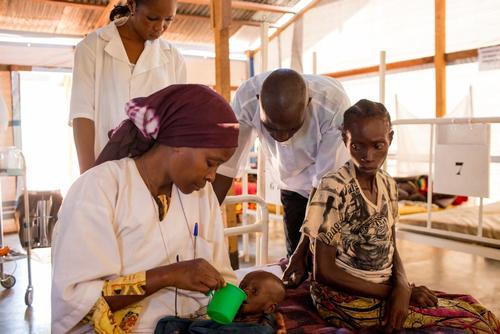After two suspected cases of measles were reported in the displaced persons camp in Carnot in west Central African Republic, Médecins Sans Frontières (MSF) vaccinated186 children aged between six months and 15 years against the killer disease in just one day.
520 displaced people are still in the enclave in Carnot where they sought refuge in February 2014. Mostly families of Muslim shopkeepers, they have been languishing in deplorable conditions in the town’s Catholic church for over 18 months. The families live with their meagre possessions – mats, a few bundles of clothes and some food – in the church and outbuildings. There are over 200 children in the enclave, many of whom were born here.
MSF is assisting the Ministry of Health with its Expanded Vaccination Programme in Carnot. MSF’s Dr Aubin Vergnes says it is crucial to act fast when there’s a risk of an epidemic. “In overcrowded conditions like these, just one case of measles can spread like wildfire to all the children in the camp, so the health authorities and MSF prepared the vaccination campaign in under three days.”
Vaccination day kicks off with a public announcement delivered by the camp’s health promoter, Stanislas Tatale, who has worked with MSF since the displaced people first arrived in 2014. Speaking into a microphone, he informs mothers that the vaccination campaign is about to begin. A little later the MSF teams set up their equipment as the first mothers arrive with their children. Each child’s immunisation record is updated and then comes the moment so feared by the youngest children. But, the injection is soon forgotten and they go back to play.
At the end of the morning, Harouna comes to have her three-year old daughter Koukaya vaccinated. Cradling five-month old daughter Mariam in her arms, she keeps a tight hold on Koukaya to make sure she doesn’t run off when she sees the needle. As Harouna says, “it’s essential to protect our children against diseases like measles. We suffered an awful lot during the crisis but, as long as we stay in the church, we’re safe and we can get medical care.” Home to Harouna is a mat on the church floor and, on Sundays, she gathers up her belongings to make room for parishioners attending mass. When baby Mariam was about to be born, MSF referred Harouna to Carnot hospital so that she could give birth in complete safety.
The situation in Carnot remains tense and most of the displaced don’t dare return home. On 29 August, Mamadou left the church to go into town and several individuals armed with machetes attacked him, wounding his face and leg. MSF referred him to the hospital for treatment. Mamadou returned that evening with several stitches – and the certainty that the time to go home had not yet come.
MSF has worked in Carnot since 2009, providing support to the hospital (paediatric, nutrition and internal medicine departments) and two peripheral health centres. Since February 2014, the organisation has also been providing medical care to the displaced people who have sought refuge in the Catholic church. A live-in health worker refers serious cases to the hospital and every Thursday a mobile clinic dispenses basic medical care for the 520 people living in the church.
Between January and June 2015, MSF gave more than 25,000 medical consultations and treated over 18,900 patients suffering from malaria as part of its activities in Carnot.




